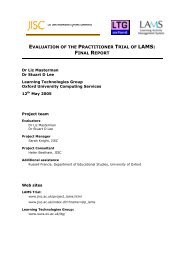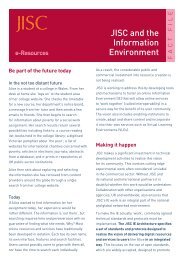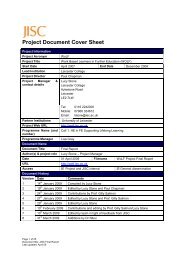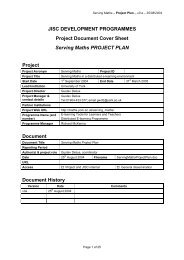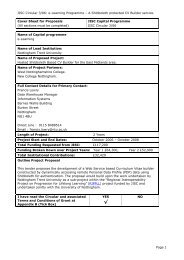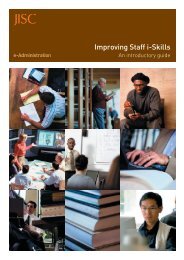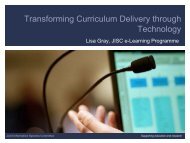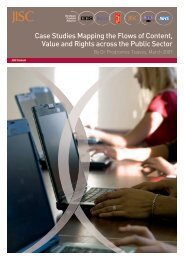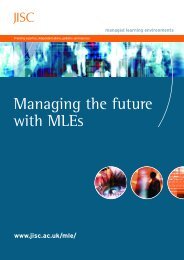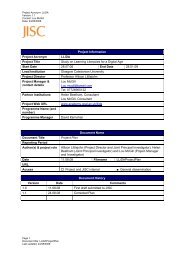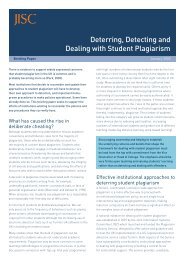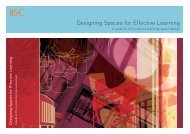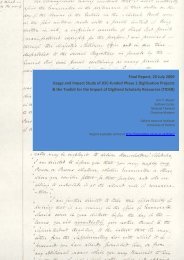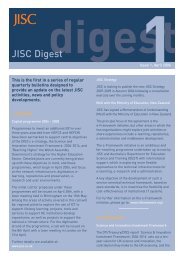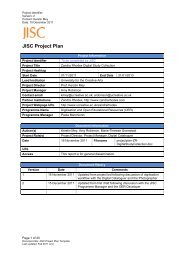Case study 4: Designing interactive assessments to promote ... - Jisc
Case study 4: Designing interactive assessments to promote ... - Jisc
Case study 4: Designing interactive assessments to promote ... - Jisc
You also want an ePaper? Increase the reach of your titles
YUMPU automatically turns print PDFs into web optimized ePapers that Google loves.
<strong>Designing</strong> <strong>interactive</strong> <strong>assessments</strong> <strong>to</strong> <strong>promote</strong> independent learning – The Open University<br />
©HEFCE 2010<br />
An iCMA question of the type used in S104<br />
Each OpenMark question for the S104 course is produced by an academic member of the course<br />
team, implemented by a media developer and checked by both the academic author and an<br />
experienced consultant. iCMAs designed <strong>to</strong> support more discursive aspects of the course – for<br />
example the question on geology shown above – now support free-text answers of around 20 words<br />
in length. The answer matching for these questions is written by a member of a course team using an<br />
authoring <strong>to</strong>ol developed by Intelligent Assessment Technologies (IAT) integrated in<strong>to</strong> the OpenMark<br />
system. (IAT uses computational linguistics <strong>to</strong> compare student responses against the set of<br />
predicted responses.) In these cases, each student response is sent from the OpenMark server <strong>to</strong> an<br />
IAT server in order <strong>to</strong> verify it and trigger appropriate feedback.<br />
However, trials in 2009 have shown OpenMark’s answer-matching capability in short-answer free-text<br />
questions <strong>to</strong> be on a par with both the IAT system and human markers. As a result, questions<br />
requiring free-text answers that are currently supported by the IAT software will migrate <strong>to</strong> OpenMark<br />
from 2010.<br />
Lessons learnt<br />
Producing <strong>interactive</strong> <strong>assessments</strong> with high-quality feedback is a time-consuming and complex<br />
process for which a sound business case must be made. To function well, questions must support a<br />
range of ability levels and play a confidence-building role while still communicating course<br />
expectations <strong>to</strong> learners. Subject and technical expertise need <strong>to</strong> be combined with question and<br />
feedback authoring skills and each question must be rigorously tested for impact, usability and<br />
accessibility if it is <strong>to</strong> be employed for summative purposes.<br />
Although individual tu<strong>to</strong>rs at the Open University can produce iCMAs (authoring <strong>to</strong>ols are being made<br />
available within Moodle for this purpose), the university’s Learning and Teaching Solutions Unit is<br />
involved in the development of most iCMAs used on Open University courses. This situation is likely<br />
<strong>to</strong> change as the benefits of iCMAs become more widely recognised, but iCMAs for summative<br />
purposes will still require rigorous checking by expert authors.<br />
Advantages gained<br />
iCMAs offer learners a range of benefits:<br />
• Opportunities <strong>to</strong> assess progress and understanding anytime, anywhere<br />
Page 3 of 5<br />
Effective Assessment in a Digital Age case studies: www.jisc.ac.uk/digiassess



